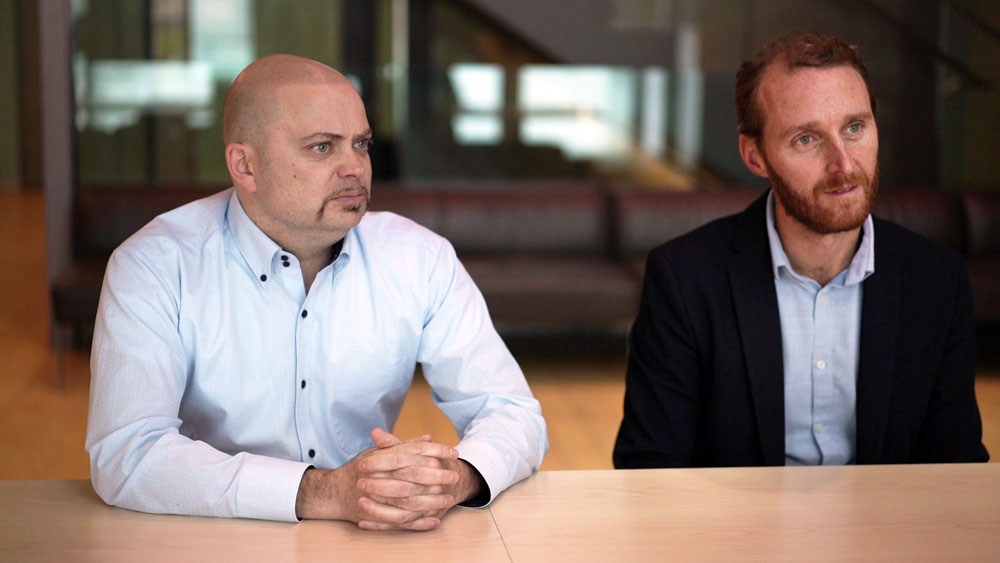
Using big data techniques to analyze the function of human genes is already helping develop treatments tailored to individual patients. The more data researchers can access from across the world, the better chances of treating even rare diseases. But privacy and consent regulations differ by country, making sharing this information across borders slow and frustrating.
Researchers at McGill, in partnership with their international and Canadian colleagues, are developing new tools and frameworks to solve this problem, so that scientists anywhere in the world can openly contribute and access information.
We sat down to talk epigenetics, open science and personalized medicine with Guillaume Bourque, Director of the Canadian Centre for Computational Genomics, and Yann Joly, Research Director of the Centre of Genomics and Policies.
It’s now been over 15 years since the human genome has been sequenced, an achievement that was expected to unlock the mysteries of genetics and many diseases. Where are we with this today?
GB: Sequencing the human genome was an important first step. Following this major accomplishment, Eric Lander, one of the biologists involved in the project, summed this up as: “Genome: Bought the book; hard to read.” In other words, the entire set of the human gene sequence – the code – is available to us, but we now need to try to understand how our body uses the genetic information in different contexts. For example, the cells in our body all have the same genome in their nucleus, the same set of genes, but each type of cell is, however, very different from one another.
What explains these differences?
GB: Each type of cell in the human body is the outcome of a combination of genes, but their activation depends on a series of molecular annotations. These annotations, referred to as the “epigenome,” indicate which genes need to be activated, which in turn determines whether a cell will become a blood cell or a nerve cell. The epigenome is dynamic and transforms based on the development stage of cells and their environment. Currently, we know that a number of diseases develop when these instructions are disrupted.
So, mapping the epigenome is therefore just as important as mapping the genome?
GB: Yes, and that’s why we are part of a joint project with the International Human Epigenome Consortium: a global team of scientists (Canada, European Union, Germany, Hong Kong, Japan, Singapore, South Korea, United States) hoping to determine the epigenetic profile of 1000 types of human cells in their normal state. Somewhat in the same spirit as the Human Genome project, which sequenced the genetic code, the idea is to share this information, which will be collected and made available to researchers all over the world. This will allow them to compare the epigenome of diseased and healthy cells, identify the disrupted molecular processes in a disease and explore new therapeutic possibilities.
So, it’s an initiative within the open science movement?
YJ: Yes, but there are certain challenges in sharing information. Some medical information comes from countries where the legislation governing the use of this type of data is very different from our laws. Scientists must therefore submit multiple requests with partner countries and they sometimes wait up to a year before they are able to use the information. To facilitate sharing of these databases, we developed the EpiShare project jointly with the Global Alliance for Genomics & Health. The objective is to develop a regulatory framework and computer tools to ensure responsible and secure data sharing with scientists, in an almost direct manner.
What is McGill’s contribution to this collaborative initiative?
YJ: We need to comply with certain regulations regarding consent and privacy protection with respect to individuals who have given permission to have their medical data used for research purposes. McGill University’s Centre of Genomics and Policies is unique, since it is comprised of researchers from various disciplines. Our multidisciplinary and comparative approach allows genomics specialists to work with researchers interested in the social, ethical or legal impacts of basic research carried out by their peers. This model is unique to Canada and is not very common elsewhere in the world. That is why already, we play an important role with a certain number of Canadian and international consortiums dedicated to sharing medical and genetic information.
Many dream of the day when people will be treated based on their genetic profile. How can data sharing one day lead to personalized medicine?
GB: Because some diseases are so rare, this makes it difficult to study them. Imagine a disease where only five cases are reported nation wide… When this kind of genetic information is shared in an international database, it increases the chances of finding other patients who have the same mutations, which makes it possible to conduct more robust studies to understand the disease and identify treatments. From my perspective, there is no doubt: sharing medical information globally, as we are proposing in Epishare, will be critical to the advancement of personalized medicine.
Read more:
